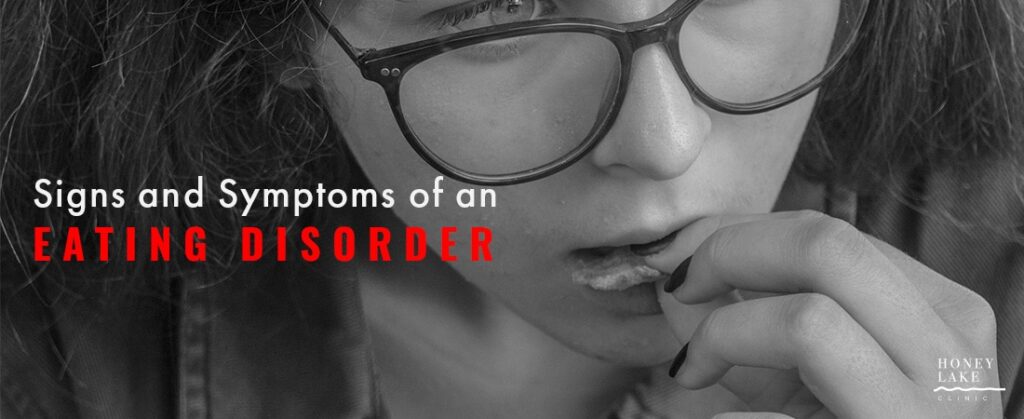Signs and Symptoms of an Eating Disorder
Eating disorders are conditions marked by an unhealthy relationship with food expressed through abnormal eating habits. Eating disorders often develop during the teenage and young adult years, and are much more common in girls and women.
While the precise cause of eating disorders is unknown, they seem to coexist with other issues such as low self-esteem, depression, anxiety emotional difficulties, and substance abuse.
Do you suspect you or someone you love has an eating disorder? We can help. Have a confidential conversation with a counselor right now. Call (888) 837-6577.
While there are a number of different eating disorders, three of the most common are Anorexia Nervosa, Bulimia Nervosa, and Binge Eating Disorder. Here’s a breakdown of signs and symptoms to watch for with each:
Common signs and symptoms of Anorexia Nervosa include:
- Being considerably underweight compared to people of similar age and height.
- Very restricted eating patterns.
- An intense fear of gaining weight or persistent behaviors to avoid gaining weight, despite being underweight.
- A relentless pursuit of thinness and unwillingness to maintain a healthy weight.
- A heavy influence of body weight or perceived body shape on self-esteem.
- A distorted body image, including denial of being seriously underweight.
People with anorexia nervosa tend to have unrealistic fears of gaining weight. They often diet and exercise relentlessly, sometimes even to the point of starving. Many with anorexia also binge and purge by vomiting or misusing laxatives. Does any of this sound familiar?
Untreated, anorexia can lead to serious consequences such as malnutrition and organ failure. With treatment, however, most gain back weight they’ve lost, and the physical problems they’d developed as a result of anorexia improve.
Common signs and symptoms of Bulimia Nervosa include:
- Recurrent episodes of binge eating, with a feeling of lack of control
- Recurrent episodes of inappropriate purging behaviors to prevent weight gain
- A self-esteem overly influenced by body shape and weight
- A fear of gaining weight, despite having a normal weight
People with bulimia nervosa typically have episodes of eating large amounts of food (called bingeing) followed by purging (vomiting or using laxatives), fasting, or exercising excessively to compensate for the overeating. Does any of this sound familiar?
Untreated, bulimia can result in long-term health problems such as abnormal heart rhythms, bleeding esophagus due to excessive reflux, and kidney problems. However, bulimia can be treated successfully, and many of the physical problems associated with it can improve.
Common signs and symptoms of Binge Eating Disorder include:
- Eating large amounts of foods rapidly, in secret and until uncomfortably full, despite not feeling hungry.
- Feeling a lack of control during episodes of binge eating.
- Feelings of distress, such as shame, disgust or guilt, when thinking about the binge-eating behavior.
- No use of purging behaviors, such as calorie restriction, vomiting, excessive exercise or laxative or diuretic use, to compensate for the binging.
People with binge eating disorder frequently binge on large quantities of food. Like people with bulimia, they often feel out of control during these episodes and later feel guilt and shame about it. The behavior becomes a vicious cycle, because the more distressed they feel about bingeing, the more they do it. Because people with binge eating disorder do not purge, fast, or exercise after they binge, they are typically overweight. Does any of this sound familiar?
Because binge eating leads to obesity, it can have serious health consequences if left untreated.
If you or someone you love suffers with bulimia, there is hope. Treatment is available that can offer you the chance for complete recovery.
Recognizing the signs and symptoms of an eating disorder is the first step to getting you help for it. Eating disorders are treatable, and with the right treatment and support, you can get your life back on track. We can help.
At Honey Lake Clinic, our experienced staff, licensed therapists, psychologists, and psychiatric specialists understand that effective treatment for eating disorders requires a multifaceted, faith-based approach, involving healing of the body, mind, and spirit. Our unique treatment programs specifically and deeply address all three spheres, offering each client his or her greatest chance at wholeness and transformative growth.
